GRANDPARENTS are the most undervalued resource in society: that is a belief that is quietly fuelling new initiatives that have been gaining momentum in London and beyond.
The Grandparents Learning Circle has emerged from St Mark’s, Teddington, in the diocese of London. While the Learning Circle was set up by church members (and is fully supported by the congregation and clergy), anyone can join. The focus is on learning how to be the best grandparents possible, not exclusively on passing on faith.
Circle members meet every month in one of their homes for dinner and chat. They tell a personal story for two minutes each, then they look at one discussion topic together. Notes are taken for reflection.
People speak of both anguish and joy. They follow a simple format, and often come away changed. They feel more confident, less guilty, and better equipped.
It started in 2015 with a question. A churchwarden, John Bazalgette, looked at the then 40-strong congregation of St Mark’s and thought, “I wonder how many of these are grandparents, and how far are they able to be a resource to their grandchildren?”
A seasoned academic, Mr Bazalgette had a background in teaching and training leaders in education. Designing courses, he saw the “hidden curriculum”: the unintended lessons that students capture through interactions. He wanted to apply the things that he had learned to supporting grandparents in an ageist culture.
“We decided: let’s change this idea of [the older generation] being a burden to society,” Mr Bazalgette recalls. “We’ll just show that actually we have learned from our experience.”
He and his wife, Jane, invited two other couples to supper. They looked at how they could create a space in which grandparents could speak “openly, frankly, and truthfully”. They decided to start meeting. “It was as simple as that,” he says.
The group came from within and beyond the congregation. “So, when we talk about grandparenting, we are talking about grandparenting as a human act,” says Mr Bazalgette. Aged 89, he has five children, ten grandchildren, three step-grandchildren, and four step-great-grandchildren. “My hidden curriculum is pretty rich,” he jokes.
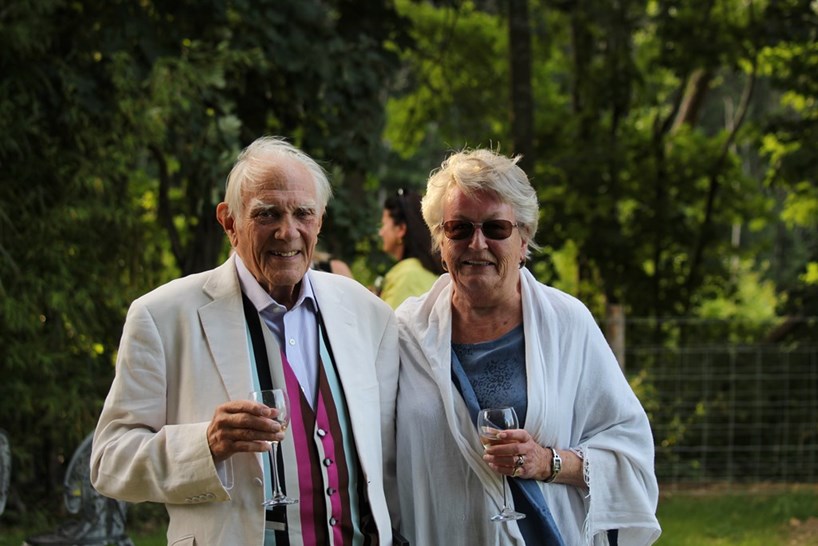 Jill BlaneJohn and Jane Bazalgette, founders of the Grandparents Learning Circle, at their 60th-wedding-anniversary celebration
Jill BlaneJohn and Jane Bazalgette, founders of the Grandparents Learning Circle, at their 60th-wedding-anniversary celebration
Mr Bazalgette says that many of his contemporaries say that the internet, social media, and the fragmented culture around them leave them feeling that they have little to offer to the younger generation. One middle-aged couple accused Mr Bazalgette of belonging to “a discredited generation”.
The Grandparents Learning Circle opens up a reservoir of untapped wisdom. “When shared, this empowers grandparents to set strong examples of learning to belong in today’s world, even in the most challenging circumstances,” Mr Bazalgette says.
Ten years on from the start, Mr Bazalgette is still involved, but the Circle’s “convener” is now Pauline Humphreys, another member the congregation at St Mark’s, who, among other things, helps to guide the discussions. “We want them to feel secure,” Mrs Humphreys says of those who attend. “I just keep a very light-reined control on it . . . not cutting them off when they’re in the need to express themselves. So, it’s a sort of delicate balance.”
SUE, 79, who has five grandchildren, is one example of the Grandparents Learning Circle’s diverse membership. She is not a worshipper at St Mark’s, and sees herself as a humanist, but is comfortable to be part of a group with church connections.
She and her husband, Nick, had worked with Mr Bazalgette on a marriage project. Mr Bazalgette invited them to the Grandparents Learning Circle. “We happily went along. We very much liked the whole idea of the group,” she says.
“The idea of the Circle is to empower grandparents, to help them feel confident in the role they’re fulfilling, and therefore to encourage them to feel positive in that role — even though sometimes the role can be a difficult one to negotiate.
“If we mutually learn from each other’s experience, and support each other, then we can improve our ability to be very effective grandparents. It all makes perfect sense to me — it always has done — that people within a community setting can achieve so much more than people on their own.”
Sue likes the two-minute talks. “We tell these little stories. That’s very important, because that means nobody comes to the meeting as a passive person,” she says.
What kind of stories are told? “Literally, because of the nature of life itself, stories of every conceivable kind: stories that are really sad and troublesome, where a grandparent has tried to reach a son or daughter-in-law, or somebody within the family, to celebrate a birthday, or to make contact with a grandchild, and that hasn’t worked. Or stories about wonderful outings with grandchildren, or a letter from a grandchild that’s been written to a grandmother and has come all the way from Australia.”
Over the years, she has seen the group’s discussion topics change. “At the beginning of the Learning Circle, we had extensive discussions about how to use letter-writing. Now, of course, it’s regular WhatsApps, FaceTime, and things of that kind,” she recalls.
Sue’s husband died in 2022. She continued to attend the meetings, which then helped her in a different way. “It became a very important support mechanism in my grief,” she says.
ANTHONY is a long-time worshipper at St Mark’s; he’s been a deanery-synod representative for ten years, and his wife, Linda, was christened at the church. He is another example of the Grandparents Learning Circle’s broad membership. “I’m not actually a grandparent,” he admits. “My wife and myself have 42 nieces, nephews, great-nieces, and -nephews.”
Involved with Scouting for 46 years, Anthony has run a troop and Explorer units. Now 72, he points out: “I’ve dealt with youth all my life, and my wife still does — she’s involved with Scouting.” They pick up great-nieces and great-nephews from school, and often the children stay with them.
“John said he was setting up the group. He didn’t have many people; so we said we’d go along just to help him start it up,” Anthony says. Mr Bazalgette gave the couple a special classification: “Elders”.
Linda has other commitments now, but Anthony has stuck with it. “It’s good — listening, seeing how you can sort of help people to help the youngsters.” He admits that he’s an oddity, attending as an uncle/great-uncle. But Anthony talks about his own experiences in the meetings, such as making sure that visiting nephews and nieces eat with him and Linda at the table, where they have proper space to chat.
What does Anthony think are the highlights of the Circle? “You chat with people, and you learn through their difficulties how you can resolve your own difficulties, or your grandchildren’s difficulties. That’s something I enjoy about it, which is why I carry on going.” Then, he adds, “Mind you, some people’s foods are always a highlight!”
Chris is another member of the congregation at St Mark’s. She heard about the Grandparents Learning Circle at church. Aged 76, she has two grandchildren.
She spent her first meeting “quietly listening”, she says. “Then I started talking about my life, and one thing and another. . . We know each other at church and out of church as well. So, it just felt like being a family really.”
In fact, being part of the Listening Circle has had a profound effect on Chris. “When I was younger, I didn’t like talking very much. I didn’t like going to parties and things. I felt very insecure.” Being part of the Grandparents Learning Circle has given her courage. “It helps you to think about things, and it helps to talk. If you’re worried about something and you want to talk about it, you can.”
And the experience definitely helps in her grandparenting. “It helps me to understand my grandchildren a lot more, and my own children; it helps me to understand where they’re coming from.”
It has also made her feel less guilty about her struggles as a parent and a grandparent. Someone once commented that she must be a “rock” for her family. “That made me feel a bit better,” Chris recalls.
Chris also believes that the Grandparents Learning Circle is good for the church. “It helps people in church; it makes it a better church — because it’s not just a matter of going to church and praying. . . It’s to communicate with people, isn’t it — to talk to people, treat people as human beings.”
WHEN the Minister-in-Charge at St Mark’s, the Revd Tom Simpson, started at the church a year ago, he heard about the Grandparents Learning Circle from the church community. Not old enough to be a granddad, he still wanted to experience this unique group for himself.
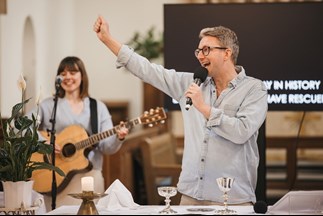 Hamish JordanThe Minister-in-Charge of St Mark’s, Teddington, the Revd Tom Simpson
Hamish JordanThe Minister-in-Charge of St Mark’s, Teddington, the Revd Tom Simpson
He went along to a meeting, and found a range of people from different socio-economic backgrounds and life experiences, all united by grandparenting. They were finding out what part they played “in a rapidly changing world that more often than not is quite dismissive of age”, he says.
Mr Simpson is delighted with the Circle’s impact. “It seems like a great group to be at the edge of church life, fraying the boundary for people so they can encounter the church . . . in a setting that helps do what Church does: build community, transform lives.”
The Circle sums up a pithy expression shared at St Mark’s: to have “warm fires and open doors”.
“We know what we’re gathering around, and who we are as the church. But we also have open doors, so people can come and explore,” Mr Simpson says.
Last year, the diocese of London published an article about the Grandparents Learning Circle that has been developing in Teddington. The diocese is currently designing a resource for other congregations, on how to start their own Grandparents Learning Circle, which will be released later this year.
Support for the faithful generation of grandparents
DIOCESES in other parts of the country are also responding to a growing interest in the part played by grandparenting, in faith development and other matters.
Using smartphones to help grandparents to talk about faith with their grandchildren is part of the aim of a hands-on workshop planned by the diocese of Truro for 9 October, at Epiphany House.
The Revd Howard Peskett, a biblical scholar, will demonstrate some apps to help grandparents with their grandchildren’s spiritual development. Those attending will also be invited to describe their own experiences and favourite apps.
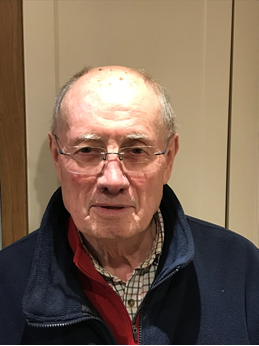 The Revd Howard Peskett, who points grandparents towards useful Bible-based apps
The Revd Howard Peskett, who points grandparents towards useful Bible-based apps
“I’m just so conscious of how my grandchildren live in a visual world,” Mr Peskett said. “Whenever I open an app on my phone, if there’s something interesting, they’ll all cluster around and have a look. That affected my thinking.”
Aged 82, Mr Peskett has four grandchildren, some of whom live abroad; so he is well accustomed to using his phone to keep in touch with them. But, even though technology is a lifeline for him and his family, he admits that he is not an expert on smartphones or computers.
A former Senior Hebrew Scholar of Cambridge University, Cornish Bard, and co-ordinator of the Cornish Bible Project, he has been a teacher in Singapore and Bristol, and Rural Dean in Penwith. But, in the area of tech, he says, “I’m not the wizard who’s going to teach you all you need to know about this. I’m just a grandparent with a phone. I just have discovered that this might open up the way to conversations that you might not otherwise have.”
THE diocese of Gloucester focused on grandparents and grandchildren with two “Faithful Generations” events earlier this year: one in Gloucester Cathedral, that included art activities, DJ set, prayer stations, sensory spaces, and a dance workshop.
A follow-up workshop for adults, exploring how grandparents (and those in grandparent-like roles) could nurture supportive and faith-filled relationships with children in their families, churches, and communities, was led by the writer and speaker Becky Sedgwick, whose book Grandparenting For Faith is a current bestseller for the publisher BRF.
The senior children and families connector for the diocese of Gloucester, the Revd Canon Jo Wetherall, said: “Faithful Generations [is seeking] to affirm, inspire, equip, and celebrate Christians who long to share their faith with younger generations, but may not know how to start the conversation.
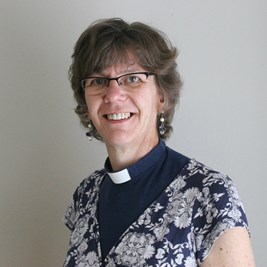 The senior children and families connector for the diocese of Gloucester, Canon Jo Wetherall
The senior children and families connector for the diocese of Gloucester, Canon Jo Wetherall
“Sharing Christian stories or modelling our faith doesn’t need to be limited to Sunday service time. It can happen whenever we are with a child or young person: in toddler groups, [through the] Open the Book [initiative], caring for grandchildren, and many other contexts. You don’t need to have theological training or absolute answers, but to remain open-hearted and explore the big issues together.
“We know how significant authentic, stable relationships with grandparents or grandparent figures are in the lives of children and young people.
“The Faithful Generation events aim to enable conversations about faith which feel normal, are not super-spiritualised, but recognise the presence of God in everyday life. We are also realistic in that, for some people, sharing faith in their families is problematic. We want to acknowledge this and support them.”
In Gloucester diocese, the plan is to spread the training across deaneries, and set up grandparent circles for ongoing peer support. A follow-up event is also planned for next February.
MS SEDGWICK, a former children and families’ worker in Wiltshire, is resources co-ordinator for Parenting for Faith, one of the ministries of BRF, seeking to equip parents, carers, and churches to boost their children’s and teenagers’ spiritual development.
Aged 60, Ms Sedgwick explains her entry into the grandparenting arena. Every time she ran a Parenting for Faith course, grandparents would come along. “At one course, I decided I would run a grandparenting stream,” she said. “I found a lovely grandparent herself who loved running parenting courses, a super pastoral lady. We’d do the teaching, and then they got into their little groups.”
People were in tears as the course appeared to shift from formal training to “mopping up grief and shame”, as Ms Sedgwick put it.
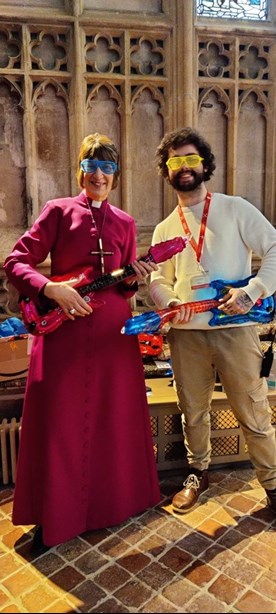 The Bishop of Gloucester, the Rt Revd Rachel Treweek, with the Revd Dr Steve Bullock, an Assistant Curate in Tetbury, Beverston, Long Newnton and Shipton Moyne, who brought along his DJ deck to transform Gloucester Cathedral with club-style worship music at the Faithful Generations event this year
The Bishop of Gloucester, the Rt Revd Rachel Treweek, with the Revd Dr Steve Bullock, an Assistant Curate in Tetbury, Beverston, Long Newnton and Shipton Moyne, who brought along his DJ deck to transform Gloucester Cathedral with club-style worship music at the Faithful Generations event this year
“These grandparents who were here in church, who brought their children up as Christians, carried this really silent grief that their children weren’t walking with Jesus, and so their grandchildren weren’t. They carried shame as well, because nobody ever talked about it.
“Nobody ever says that’s normal, because all Christian parents and grandparents probably do think the ‘shiny Christian family’ is the norm. And we’re actually saying, ‘oh no it’s not’.”
The BRF team wanted to find out more, so they could be more effective in helping grandparents. Ms Sedgwick and her colleagues started researching for their grandparenting book. They ran a Google questionnaire to ask grandchildren how their grandparents influenced their faith.
“That was a total game-changer,” Ms Sedgwick said. “We got over 300 replies, and it was astonishing. It was this wonderful picture of very ordinary grandparents doing very ordinary things that had impact.
“A lot of it was around connection — if you had a close relationship with a grandparent, faith was more likely to be transmitted. But also just about observing over time, very often. It usually wasn’t an incident that went ‘bang’, it was observing over time that this faith was powerful and relevant.”
A new Grandparenting for Faith course is planned for a July launch, developed by BRF with the Institute for Children, Youth and Mission. The course will comprise six sessions, which people can complete on their own or with others. There will also be a single-session course for church leaders or representatives interested in equipping grandparents in their churches. BRF says that the aim is to empower Christian grandparents and grandparent-figures to “share God with the children they love most”.
















